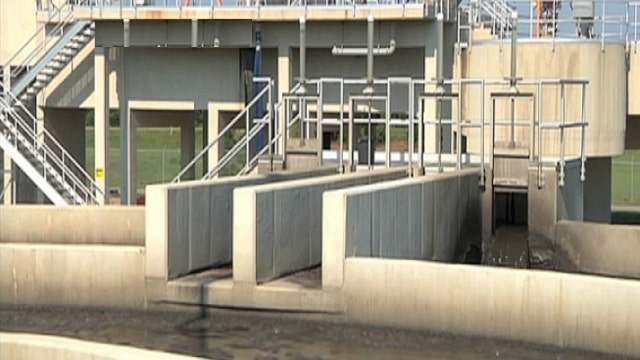From poop to power: Researchers convert sewer sludge to fuel
Kyle Rothenberg shows us how researchers at Mississippi State University have developed a process to convert human waste sludge into an alternative energy source
Human waste can create much more than a foul odor.
Researchers at Mississippi State University have created a patented process which turns our by-products into an alternative diesel energy source.
Publicly owned wastewater treatment plants generate over 8 million tons of sewage sludge annually, according to the U.S. Environmental Protection Agency. A typical family of four generates up to 400 gallons of wastewater per day and pays $435 per year, according to the National Association of Clean Water Agencies.
Miss. State University Chemical Engineering Professor Todd French told FoxNews.com that the technology he is working on has the potential to decrease what we pay for sewer and trash because cities would be making money off the waste products.
“You pay to dispose of your waste – your body waste or your trash,” French said. “This technology allows us to capture some of that and put it back into a usable fuel.”
His process involves treating the wastewater by separating liquids from solids. That solid becomes a thick goopy material called sludge. This bacteria inside the sludge is then combined with sugars that break it down — ultimately becoming an oily fat that can be used as a diesel alternative fuel source for cars and trucks. French said that the diesel converted from biocrude oils would burn in a similar way to diesel processed from petroleum.
Even though French’s team is doing this on a small scale right now, he hopes one day to produce the oil at water treatment plants and sell it to diesel producers — offsetting some of the energy costs and passing those savings onto the consumer. French estimated that the city waste plants can sell the biocrude oil for about $2.50 per gallon with his process installed.
French is clear to point out how America is not going to stop using petroleum derived diesel fuel anytime soon, but said we can do a better job of using our waste more efficiently.
“We’re putting all these materials into our landfills and we’re not getting it back out. We’re going to have to deal with it at some point in time,” French said. French believes his process of converting sewer sludge into biodiesel is a more economical way than dumping it into a landfill. According to the EPA, nearly 20 percent of all sewer sludge is dumped into our landfills.
Other supporters of biomass technologies say there is another positive to these processes.
“What is really exciting about the biomass industry is we are all about sustaining rural economies,” Bob Cleaves, CEO and President of Biomass Power Association, told FoxNews.com.
Cleaves said that while he supports the biofuel industry because it’s a job creator, he also understands the downsides.
“I don’t care if it’s wind, solar, biomass — they all have their shortcomings…for biomass, the most limiting factor about our industry is that there’s a finite amount of waste in the United States,” Cleaves said, adding that the location of a city and its population size plays a role in the technology’s success.
Ron Lamberty, senior vice president of the American Coalition for Ethanol, believes biofuel has the potential to become a success if it can survive without government subsidies.
“If [biocrude] proves to be economical, then I think we will see it [in the marketplace]."
Advanced Biofuels Association President Michael McAdamss said we should take the biofuel industry seriously, even though the petroleum industry has been around much longer and is the prevailing incumbent. McAdams believes the challenge is to find a way to make biofuels competitive with the rest of the energy industry.
“How can we scale these [biofuels] up and bring them into cost competitively and how long will it take to do that — that’s what the renewable fuel standard is supposed to be about — is trying to help bring these [biofuels] to market,” McAdams said.
Renewable Fuel Standard (RFS) was created about a decade ago to develop and implement regulations to ensure that “transportation fuel sold in the U.S. contains a minimum volume of renewable fuel,” according to the EPA. McAdams said that investors are holding back to put their money into biofuels because of possible changes to the RFS.
“There’s real uncertainty about the policy here in Washington D.C. There’s a call from some to repeal the RFS -- while others are fighting over how it should be defined,” McAdams said. “I think that is the number one reason why we haven’t seen more scaling and marketability in the building of [biofuel] plants.”
And not everyone is on board with a process that ends up burning diesel fuel.
“If you know anything about diesel engines, they produce pollution that is harmful for the environment or for humans just the same way,” said Michael Noll, professor of geography at Valdosta University. “We have found smart ways to produce alternative diesel, but we have not found smart ways to avoid pollution.”
French is now working on getting a company to sponsor a demo-version of his patented process, which he estimates will cost up to $40 million. He said he hopes his research will turn into a fully commercialized process in cities across the U.S.

